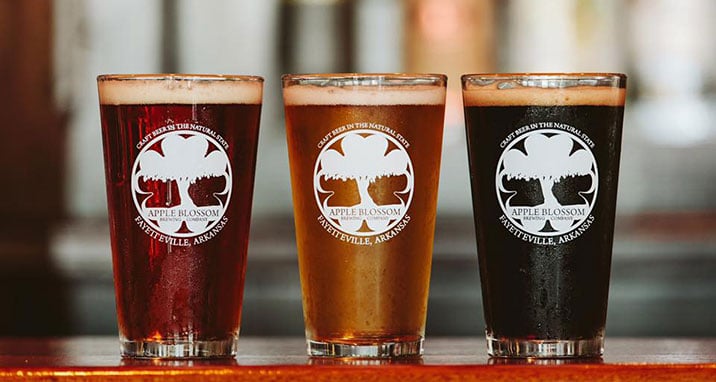
Photo: Hutch and Futch / Courtesy Apple Blossom Brewing Co.
It has been a while since any meaningful beer-related legislation was enacted down in Little Rock. That changed this year as state lawmakers approved two measures that directly impact Arkansas beer drinkers.
Act 681 – Microbrewery-restaurants in dry counties
The more significant of the two was Act 681, which allows for the operation of microbrewery-restaurants in dry counties.
Representative Spencer Hawks (R-Conway) sponsored the bill after being approached by members of his local chamber of commerce.
“The median age of Conway is 29,” he said during a recent telephone interview. “We have three colleges and a vibrant workforce. I thought it would be a great asset to communities like ours around the state.”
Arkansas remains a patchwork of wet and dry counties, and some sizeable towns — Conway being one of them — have not experienced the excitement of having their own local breweries.
According to the Brewers Association, 40 Arkansas brewers produced nearly 46,000 barrels of beer in 2018. Most of the brewing activity was concentrated in Little Rock and the Northwest Arkansas corridor. Not a drop was fermented in dry counties.
“If we want to attract young professionals to the state, we have to speak to those young professionals,” said Hawks. “Whether folks prefer to drink beer or not, it’s a part of the culture now. We can either eschew that and minimize the number of young professionals we attract, or we can embrace it like Northwest Arkansas and Little Rock.”
Under the new law, breweries must operate as private clubs and must also include an onsite restaurant. They can brew up to 45,000 barrels of beer each year, and will be able to distribute to retail accounts.
However, unlike small breweries operating under “native brewery” permits in wet counties, “microbrewery-restaurant private clubs” cannot self-distribute their products. They must use a wholesaler to get their beer to market.
Sales for off-premise consumption are not permissible under the new law.
For Hawks, creating an opportunity for brewers in dry counties makes good business sense.
“We are removing a barrier for entrepreneurs,” he said. “I’m a pro-business person, and a microbrewery is a great business.”
There are rumors of several breweries-in-planning in dry counties across the state, though none have hit the ABC’s permit report yet.
It’s probably too early to mention new breweries by name, but Conway, Jonesboro, Russellville, and Van Buren look to be prime locations for brewery startups.
Act 861 – Definition of homebrewed beer
The other piece of legislation — Act 861 — made straightforward changes to the way homebrewed beer is defined by the state of Arkansas.
The old definition somewhat arbitrarily limited the alcohol-by-volume of homebrewed beer to 5%.
That cap was lifted, and now “home-brewed beer” is simply defined as “…beer, ale, porter, stout, and other similar fermented beverages containing one-half of one percent (0.5%) or more of alcohol by volume brewed or produced by malt, wholly or in part, or from substitute for malt, for consumption but not for sale.”
More importantly, homebrewers can now legally transport their beer to locations outside their homes. They are permitted to take homebrewed beer to other places of residence, competitions, exhibitions, and organized tastings (so long as the beer is shared and not sold).
Now all of those criminal homebrewers schlepping a few bottles of their new hazy IPA to a friend’s house can do so on the right side of the law.
State Representative Deborah Ferguson (D-West Memphis) sponsored the legislation. According to the American Homebrewers Association, Kent Thompson of the Central Arkansas Fermenters — a Little Rock-based homebrew club — played a key role in shaping the new law.

